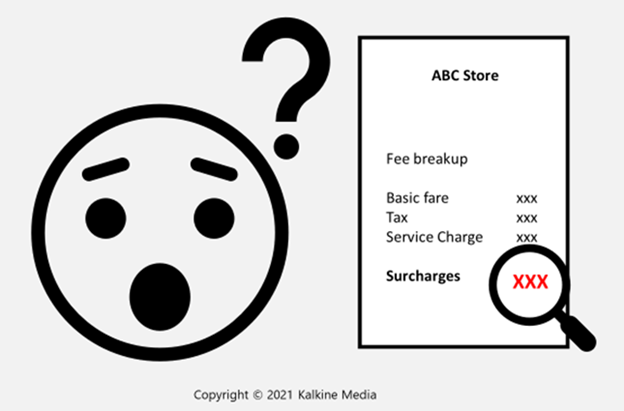A surcharge is an extra charge or fee imposed on the consumer in addition to the initial quoted price of the purchased goods or service. It is considered an indirect way to pass the burden of an additional cost on the product's end-user, keeping the product's cost unchanged.
A surcharge is considered legal in a country unless specified otherwise by law.
This extra fee reflects the business’ requirement to pay for additional services or expenses either to the authorities or some other business. It is included by many industries, such as telecommunications, cable, travelling, etc.

What are some examples of a surcharge?
Some of the examples of surcharge from various industries are as follows:
Banking: One of the most common forms of surcharge in the banking sector is reflected in the service of automated teller machines (ATM), known as ATM surcharges. It is charged upon withdrawing the cash from another bank’s ATM.
Hospitality: Hotels and resorts charge additional fees on the amenities and comfort (or luxury) they offer. These surcharges can include energy surcharge (passing the rising energy cost on to the customers on a per day basis), groundskeeping surcharge (it is the cost added in the customer’s total hotel bill to maintain the lawns, grounds or golf courses).
Airlines: An airline ticket primarily includes the base fare, fuel surcharge, other charges, user development fees, passenger service fee, etc. A fuel surcharge is a cost evaluated by the carrier to account for geographical and seasonal variations in the fuel prices. Fuel bills contribute a lot to the operation cost of an airline. Therefore, almost all airlines include a fuel surcharge in their ticket fares.
The airport operator also charges a user development fee from the passenger against the cost borne in developing the airport.
Summary
- A surcharge is an extra charge or fee imposed on the consumer in addition to the initial quoted price of the purchased goods or service.
- It is considered legal in a country unless specified otherwise by law.
- The retailers or merchants can also offer schemes like cash discount or permanent convenience fees instead of surcharging the consumer.
Frequently Asked Questions (FAQs)
- What is a convenience fee? How is it different from a surcharge?
A convenience fee is an amount charged by the seller or service provider when the buyer chooses to pay using an electronic card rather than the standard mode accepted by the seller. This fee can be a fixed amount or vary as per the total bill.
Let us understand the difference between a convenience fee and a surcharge using an example.
If a person wishes to order food online using an application instead of going to the restaurant and picking up the food, the online application is allowed to charge a convenience fee of a certain per cent of the total bill.
On the other hand, if a customer wishes to make a payment using a credit card at a store that accepts only cash and debit card, the storekeeper can add a surcharge cost to the total bill. The surcharge fee is the amount that the banking merchant will charge to the storekeeper for processing the transaction done using a credit card.
- What is the difference between a surcharge and surtax?
A surtax is a tax imposed by the government on another tax. It is charged when the government is raising funds for a particular initiative, such as the military or health. It is different from income taxes and sales taxes as they are collected by the government to fund various programs. It can also be called a surcharge tax.
The key difference between a surtax and a surcharge is that the former is legal, and the latter is illegal in many countries. Also, a surcharge is other’s liability borne by the consumer of the service or product.
- How do ATM surcharges benefit banks and customers?
Let us discuss the comfort or advantages that ATM surcharges provide to customers and banks, even though they are assumed to affect the transaction volume and competition in the long run.
- Maintaining ATMs: Banks have deployed ATMs almost everywhere to match the rising consumer demand, such as in airports, resorts, stadiums, etc. where the interchange fee is too high. Due to the increased number of ATMs, transaction volume per machine has also reduced over the years. In addition, machines installed in remote areas where the transaction volume is low attracts high maintenance cost to the banks.Surcharges help to maintain these ATMs.
- Setting up new ATMs: Surcharges also help banks expand the existing network of ATMs further, especially to remote areas, taking the convenience of easy access to cash beyond big cities.
- How do ATM surcharges disadvantage people?
- Customer inconvenience: While the extra payment can help the banks, surcharge comes as an inconvenience to the customers as it taxes them for using another bank’s ATM, disregard of the situation.
- Transaction fees: Every time a customer who is not an account holder withdraws money from the ATM, they can be made to pay interchange fee as well as surcharge fees. This has given rise to the debate that ATM owners gain excessively from ATM transactions.
- What can be the alternatives to applying surcharges on credit card payments?
There can be some alternatives that can encourage merchants to accept all form of card payments and put a stop on applying unnecessary surcharges on the consumer. For instance:
- Convenience Fee: A convenience fee can be charged on all card transactions and not just on the credit card payments.
- Discounts: To avoid credit card payments, the merchants can offer discounts on the goods or services bought using cash or debit cards.
Before executing any of these strategies, however, it is advisable to do complete market research and run a pilot project before implementing it as the permanent scheme for a business.
 Please wait processing your request...
Please wait processing your request...